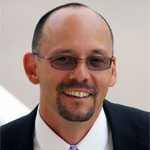Community partners

Community partners
- August 27, 2008
- UCI Community Knowledge Project, led by Michael Montoya, UC Irvine anthropology and Chicano/Latino studies assistant professor, couples academic research with community action to combat health issues linked to poverty, poor diets
 Inequality, both literally and figuratively, makes many people sick, says Michael
Montoya, UC Irvine anthropology and Chicano/Latino studies assistant professor. He,
along with a group of Orange County community members and UCI undergraduate and graduate
students, is doing something about it.
Inequality, both literally and figuratively, makes many people sick, says Michael
Montoya, UC Irvine anthropology and Chicano/Latino studies assistant professor. He,
along with a group of Orange County community members and UCI undergraduate and graduate
students, is doing something about it.
In a study published last year in Perspectives in Biology and Medicine, Montoya and co-authors Yin Paradies and Malia Fullerton, found that, contrary to
commonly held beliefs, factors such as poverty, housing segregation and poor diet
are stronger indicators of a person's likelihood of developing diabetes than race
or their ethnic gene pool (see the release at http://today.uci.edu/news/release_detail.asp?key=1598).
"Because much of the research on diabetes focuses on genes, researchers miss the
more significant and alterable causes of diabetes," Montoya says, referring to social
and environmental factors rather than the regularly studied medical and hereditary
causes.
Recognizing an opportunity through which he could incite some of those changes, Montoya
founded the Community Knowledge Project (CKP) in 2005. The "grass roots" organization
works to partner university level research with community action to address issues
such as childhood obesity, diabetes, stress, and overall community health in poverty
stricken neighborhoods in Orange County.
One project, led by Montoya and social ecology graduate student Erin Kent, has helped
Fullerton's St. Jude Medical Center gain a more realistic perspective on the health
issues facing its low-income clients. Working with Barry Ross, St. Jude Medical Center
healthy communities program vice president, the researchers engaged community members
in effective and actionable focus group-based dialogue. The results, says Ross, "reinforced
the direction of our community outreach programs and helped us better set our priorities
in meeting our community's needs."
Another student, Nick Juni, a senior biomedical engineering major, is working with
Dr. Schwindt at UCI's medical center to determine if patients' demographic information
- such as income level, education or home residence - can be helpful in explaining
elevated rates of diseases, such as diabetes or asthma, in particular neighborhoods
and population groups within Orange County.
Additional issues Montoya and his interdisciplinary team of CKP researchers and community
activists have been tackling over the past three years include working to improve
health standards for school lunch programs and developing and strengthening intramural
athletic programs in local low income communities to combat childhood obesity.
"The CKP is a means for university students and faculty to join with communities
across the nation working to improve their neighborhoods, schools and workplaces,"
he says. "Partnering with communities is not only necessary, it's the only thing that
will work in the long run to create lasting change."
Community involvement is nothing new for the community worker-turned scholar. Montoya
spent nearly a decade in the non-profit human service program development sector before
completing his graduate degree in anthropology at Stanford in 2003. During that time,
he began making discoveries that inequalities literally cause poor health, further
fueling his passion and drive to bring attention to issues like hunger and housing.
He continues to impact and study these areas in his multiple roles as Social Sciences
professor, community engagement unit research director for the Institute for Clinical
and Translational Science, and as a core faculty member in the Program in Medical
Education for the Latino Community (PRIME-LC). He also holds an appointment in UCI's
program in public health.
Montoya's collective work has earned him the UCI Community Outreach Partnership Center's
(COPC) inaugural Engaged Scholar Award, recognizing his efforts to turn healthcare
related research into real-world applications.
"The Engaged Scholar Award recognizes the work being done by faculty who embrace
the larger practice of civic engagement that calls on universities to become more
involved in their local communities," says Victor Becerra, director of COPC. "Michael's
work has been instrumental in doing just that."
- - - - -
To learn more about the CKP, visit http://www.communityknowledgeproject.org/ or view their student-led video project online at http://www.youtube.com/watch?v=Dpgw9XqMuKA.
Share on:


